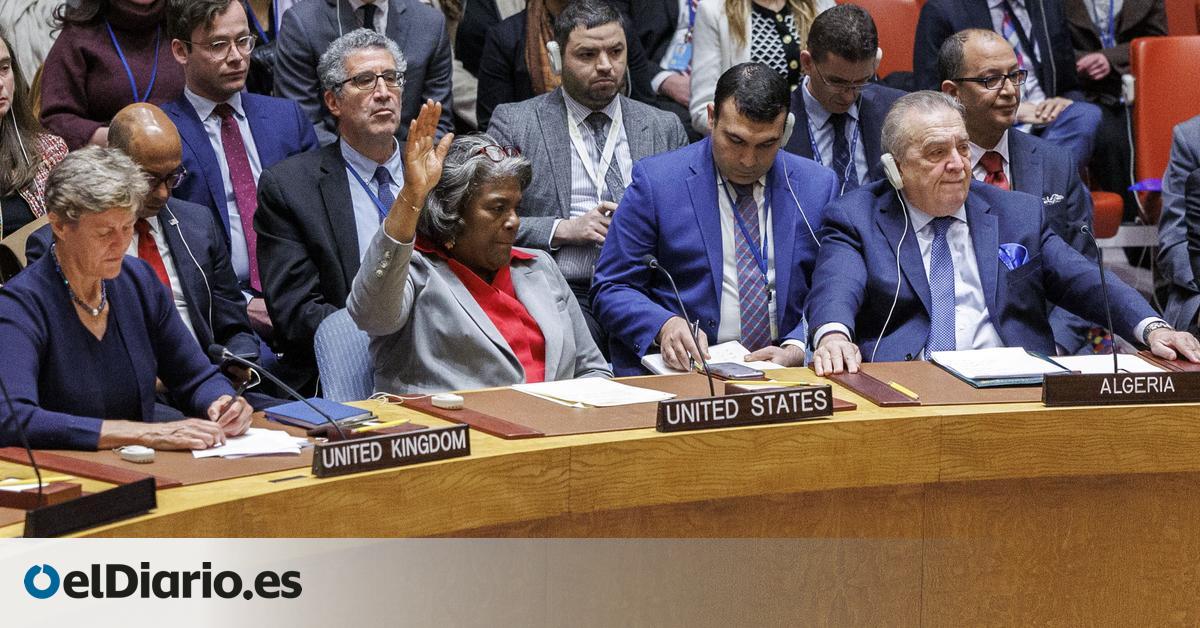
A gesture: the United States ambassador to the UN raises her hand to abstain from the vote, surrounded by the diplomats who sit at the well-known horseshoe-shaped table of the Security Council. Applause breaks out at the New York headquarters: by staying on the sidelines and not using its veto power, Washington has distanced itself from Tel Aviv and has allowed, for the first time in almost six months, the approval of a resolution that unequivocally demands a halt to the fire in Gaza.
Israel’s reaction has not been long in coming, raising tensions with its ally after a vote that redoubles pressure to end the fighting. Prime Minister Benjamin Netanyahu has canceled the visit of two of his top advisers to Washington, calling the decision a “clear setback” to the “consistent position” of the United States in the Security Council since the beginning of the offensive.
The so-called resolution 2728 has received 14 of 15 votes in favor and none against this Monday, reflecting overwhelming support for the ceasefire at a time when diplomatic negotiations have not reached a successful conclusion to give respite to the Gazan population and amid growing global pressure on Israel to achieve a truce. The text has been presented by the 10 non-permanent members of the Council and had the support of Russia, China and the Arab Group of the United Nations. Specifically, it is a call for an “immediate ceasefire” respected by all parties during the Muslim holy month of Ramadan, which ends in two weeks, and “leading to a lasting ceasefire.” At the same time, it demands the “immediate and unconditional release” of the hostages and expresses “the urgent need to expand the flow” of aid to the enclave ravaged by the Israeli Army.
Riyad Mansour, representative of the observer state of Palestine, has told ambassadors that it has taken six months and tens of thousands of Palestinian deaths to finally demand an immediate ceasefire. “Their ordeal must come to an end, and it must come to an end immediately, now,” he stated, while ensuring that the approval of the draft “must be a turning point.” “The Palestinian people have suffered a lot. This bloodbath has continued for far too long. It is our obligation to put an end to it, before it is too late,” Algeria’s ambassador to the UN, Amar Bendjama, remarked to the Council after the vote.
US abstentions on resolutions on Israel are not unprecedented, but they remain unusual. With its movement, the Biden Government has unblocked a situation of paralysis that has lasted during the more than five months of slaughter in Gaza, in which it has vetoed three draft resolutions of the Council while, with two abstentions, it had allowed the adoption watered-down texts that aimed to increase aid to Gaza and called for prolonged pauses in fighting. Hours before the vote, the UN Secretary General, Antonio Guterres, had assured that the Security Council is “a victim of the enormous geopolitical divisions” in the world. “A consensus is emerging in the international community. Even in friendly and allied countries of Israel. “I see a consensus emerging that this war must end,” Guterres had noted. But until the vote was cast, it was unclear what the United States’ position would be this time.
Until now, Washington had been reluctant to include those three words, ceasefire, and had used its veto power to back its ally and stop similar resolutions. His position evolved last week, when he presented another ceasefire text linked to the release of hostages, which fell after being vetoed by Russia and China last Friday. The document approved this Monday does not make the cessation of fighting subject to the release of the hostages – that is, it demands it, but does not make it a condition – a link that the United States had previously insisted on. This Monday morning, at the last minute, the United States asked for an amendment to add condemnation of the Palestinian group Hamas for its attacks on Israeli communities on October 7, but withdrew its request when it became clear that the amendment would be rejected. Another sticking point has been the removal of the word “permanent” from an earlier version of the draft.
The ambassador and permanent representative of the United States to the UN, Linda Thomas-Greenfield, has explained that she has abstained from the vote because she does not agree with the entire content of the resolution and the text does not include a condemnation of Hamas – something which the Israeli ambassador has called “a shame”–. “Some key amendments, including our request to add a condemnation of Hamas, were ignored, and we did not agree with everything in the resolution. For that reason, unfortunately we were not able to vote in favor. However, as I have said before, we fully support some of the critical objectives” of this resolution, which he has described as “non-binding.”
Pressure for implementation
Minutes after the result of the vote, Guterres made it clear in a message on the social network X that the resolution “must be implemented.” “Failure would be unforgivable,” he has written. A similar message has come from Brussels, where the decision of the UN Security Council was celebrated after the EU asked for the first time a ceasefire last Thursday. “The implementation of this resolution is vital for the protection of all civilians,” said the president of the European Commission, Ursula von der Leyen, in a tweet. The President of the European Council, Charles Michel, has also indicated that “it is urgent” that it be applied while the President of the European Parliament, Roberta Metsola, has stated that it is a “significant step” that “must now be implemented.” Along the same lines, the High Representative of the European Union for Foreign Affairs, Josep Borrell, says that “urgent implementation is needed by everyone.”
The text approved this Monday is, without a doubt, an unequivocal expression of the will of the international community, but the UN implementation mechanisms are limited, so they can be ignored by States, something that has already happened in the past. .
“It is a fairly clear call for a ceasefire, despite negotiations over the exact language of the text. However, there is no enforcement mechanism and the US has said that it considers it non-binding,” Richard Gowan, director of the United Nations at the International Crisis Group, tells elDiario.es. “I think Council members will argue about its legal status, but the reality is that if any Council member proposes imposing sanctions or other penalties on Israel for non-compliance, the United States will use its veto to override the proposal. So, ultimately, this is a toothless text, even if it sends important signals to Israel.”
The United States has received criticism for not being tough enough on Israel. Monday’s abstention has been widely interpreted as a reflection of tensions and growing frustration in Washington over the Israeli prime minister’s insistence on pressing ahead with his plans for a potentially devastating offensive on Rafah, which is home to hundreds of thousands. of displaced people in the southern tip of Gaza, and continued Israeli obstacles to humanitarian aid deliveries. Without going any further, the commissioner general of UNRWA, Philippe Lazzarini, denounced this Sunday that Tel Aviv has informed the UN that it will not approve more humanitarian convoys directed to the north of the Gaza Strip, where famine is already a reality.
Gowan does not believe this is a “major rupture” between the United States and Israel, but he does believe that the Biden Administration is sending “a clear diplomatic signal to Netanyahu about its concern about the state of the military campaign” in Gaza. “Israel would have preferred that the United States continue to block talks on a ceasefire in the Council,” says the expert. After the vote, the spokesman for the US National Security Council, John Kirby, reiterated to journalists: “Our vote does not represent, and I repeat, does not represent, a change in our policy.” “There is no reason for this to be seen as some kind of escalation,” he added.
In the opinion of the Crisis Group expert, “the decisive question now is what Hamas does.” “The United States has made clear that its support for a ceasefire is tied to the behavior of Hamas. If Hamas releases a significant number of hostages, the United States will likely put more diplomatic pressure on Israel to end hostilities,” he explains. “But if Hamas does not release anyone or admits that a large number of the remaining hostages are dead, as many diplomats fear, the United States is less likely to put more pressure on the Israelis.”
“A political farce with tragic consequences”
According to the Gaza Ministry of Health, since October 7, the Israeli offensive in the Palestinian enclave has killed more than 32,000 Palestinians, two thirds of whom were women and children, while warnings of imminent famine in the north of the territory and huge parts of the enclave have been left uninhabitable by incessant Israeli bombing.
“This resolution should have been adopted a long time ago, but to truly alleviate civilian casualties and address the massive devastation and suffering in Gaza, it is vital that it is implemented immediately and leads to a lasting ceasefire,” he said. said the secretary general of Amnesty International, Agnès Callamard, in a statement. “There is no time to lose. Israeli authorities must immediately stop their brutal bombing campaign in Gaza and facilitate the delivery of humanitarian aid. Israel and Hamas and other armed groups must also work to ensure that the ceasefire lasts. Civilian hostages must be released immediately. All Palestinians arbitrarily held in Israeli prisons must also be released, including civilians in Gaza,” she adds, before arguing that Palestinians in Gaza “are at risk of genocide.”
“This resolution must be accompanied by a change in political pressure, including an immediate and comprehensive arms embargo, leading to a permanent cessation of fighting and changing the harrowing situation on the ground in Gaza in the long term,” says Callamard. “In recent weeks, voting in the UN Security Council has become a political farce with tragic consequences for civilians, in which permanent members of the Council, including the United States and Russia, have abused its veto power to block rival draft resolutions. “The international community must now put political games aside and prioritize saving lives by ensuring that this resolution paves the way for a sustained ceasefire.”
Source: www.eldiario.es

